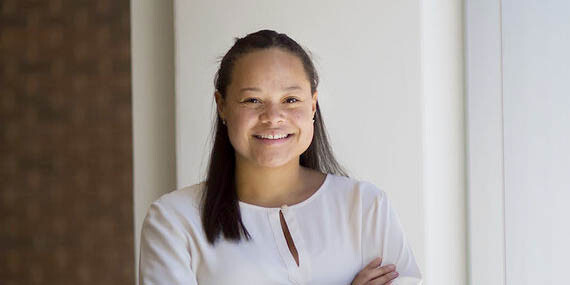Andrew Witherspoon, James McPhail, and Griffin Amdur graduated from Wharton in May. One month later, they were off to Chicago—determined to take on the Windy City as entrepreneurs.
With $100,000 in hand from Penn’s President’s Engagement Prize, established by President Amy Gutmann in 2015, the trio purchased a truck and signed a lease for a warehouse in the Southwest side of Chicago—the newly minted headquarters for their nonprofit Chicago Furniture Bank. In the following weeks, they’d fill up the 6,000-square-foot space with used furniture and other donated household items, and, in no time, completely furnish—at virtually no cost for the patrons—apartments for 16 different families in need.
“Everything has taken off much more quickly than we expected,” says McPhail, chatting over the phone after a furniture pickup. “It’s been great.”
McPhail, a graduate of the Huntsman Program in International Studies and Business, says since their move in early July, the company—the first of its kind in the city—has garnered important press, spurring recognition as well as volunteers and additional donations, including a possible second truck. Through partnerships with six nonprofits—and growing—Chicago Furniture Bank works with agencies that serve vulnerable families.
“Last week, we had three different family clients come in, one family of five and two families of four,” says McPhail. “They were able to come in and pick out their entire furnishing package.”
One family that was formerly homeless had spent two months sleeping on the floor in their government-subsidized apartment, McPhail says.
“We managed to get them all beds, desks for the kids to do homework on, a sofa, and a bunch of cooking stuff,” he says. “It was really meaningful to see them get to choose the items that they like. The kids were running around the warehouse with smiles on their faces.”
The “furnishing packages” are free to families in need, but a $50 donation is suggested, if doable. The Chicago Furniture Bank will also deliver the items for $150.
“This fee is in line with other furniture banks,” says Amdur, adding that most of Chicago Furniture Bank’s nonprofit partners are able to subsidize the cost.
“Moving into a new home is stressful and challenging,” says Witherspoon. “Our objective is to make their transition as welcoming, comfortable, and affordable as possible.”
When it comes to the supply side of their operation, Amdur, McPhail, and Witherspoon—friends since freshman year—were never worried. Right off the bat, their company received a significant donation of dressers and couches from DePaul University, after a large dorm was remodeled.
Chicago Furniture Bank, which also partners with Caring Transitions, has received numerous donations, too, from residential households, says Witherspoon. Donations can be dropped off at the warehouse or the team will pick them up for a small donation fee—one that is much less than the cost of junk removal services.
“We stay busy and are definitely really tired after moving furniture all day,” says McPhail. “It’s been a change in our lifestyles, day to day, but it’s what we expected.”
While still at Penn, the team made sure to do their due diligence so that they were able to launch the Chicago Furniture Bank right—and right away.
Their first step? Reaching out to Tyler Wry, an assistant professor of management at Wharton. Wry teaches entrepreneurship, particularly social enterprise creation.
“The first time we all sat down, they had some ideas, and I pushed back pretty hard. I wanted to challenge them to subject their ideas to real scrutiny,” says Wry. To his surprise, “they really leaned into that.”
Their model evolved as they began to better understand the space, and the students continued to make “good decisions based on the data they were gathering,” says Wry. “That’s not something you often see from young entrepreneurs. You have to overcome a lot of biases to be willing to be that flexible; I was impressed.”
The students also made sure to connect with the Philadelphia Furniture Bank, touring the local organization’s space and conversing frequently with Thomas Maroon, its director, who they still stay in touch with.
Hustling hard, McPhail, Amdur, and Witherspoon say they wouldn’t have it any other way. In the near future, they hope to continue garnering volunteers and eventually master their company’s supply-and-demand “flow,” says Amdur. Their goal for Chicago Furniture Bank’s first year is to furnish 300 apartments, helping 1,000 individuals.
“We’re just so grateful to Penn for allowing us to have this opportunity,” says McPhail. “It’s amazing that they offer students the ability to positively impact the community on such a large level, and really pursue their dreams.”



